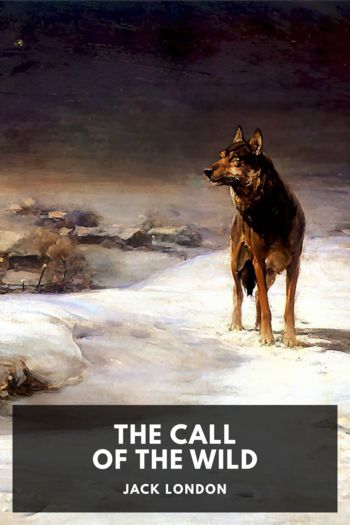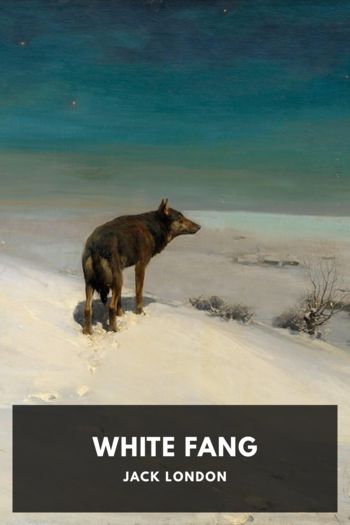The Call of the Wild by Jack London (world best books to read TXT) 📕

Description
Jack London spent nearly a year in Alaska and the Klondike, mining for gold and braving the Alaskan winter. There he was inspired to write what would become The Call of the Wild, one of his most famous novels. The Call of the Wild tells the tale of a domesticated dog stolen from his California family and sold to sledders in Alaska. As he adapts to the harsh and wild environment, he slowly sheds domestication and returns to his primal roots.
The Call of the Wild was London’s first major success, ensuring he’d have a readership for his future writing and paving the way for him to become one of the first writers to amass a fortune from just his fiction.
Read free book «The Call of the Wild by Jack London (world best books to read TXT) 📕» - read online or download for free at americanlibrarybooks.com
- Author: Jack London
Read book online «The Call of the Wild by Jack London (world best books to read TXT) 📕». Author - Jack London
And so well did he face it, that at the end of half an hour the wolves drew back discomfited. The tongues of all were out and lolling, the white fangs showing cruelly white in the moonlight. Some were lying down with heads raised and ears pricked forward; others stood on their feet, watching him; and still others were lapping water from the pool. One wolf, long and lean and gray, advanced cautiously, in a friendly manner, and Buck recognized the wild brother with whom he had run for a night and a day. He was whining softly, and, as Buck whined, they touched noses.
Then an old wolf, gaunt and battle-scarred, came forward. Buck writhed his lips into the preliminary of a snarl, but sniffed noses with him. Whereupon the old wolf sat down, pointed nose at the moon, and broke out the long wolf howl. The others sat down and howled. And now the call came to Buck in unmistakable accents. He, too, sat down and howled. This over, he came out of his angle and the pack crowded around him, sniffing in half-friendly, half-savage manner. The leaders lifted the yelp of the pack and sprang away into the woods. The wolves swung in behind, yelping in chorus. And Buck ran with them, side by side with the wild brother, yelping as he ran.
And here may well end the story of Buck. The years were not many when the Yeehats noted a change in the breed of timber wolves; for some were seen with splashes of brown on head and muzzle, and with a rift of white centring down the chest. But more remarkable than this, the Yeehats tell of a Ghost Dog that runs at the head of the pack. They are afraid of this Ghost Dog, for it has cunning greater than they, stealing from their camps in fierce winters, robbing their traps, slaying their dogs, and defying their bravest hunters.
Nay, the tale grows worse. Hunters there are who fail to return to the camp, and hunters there have been whom their tribesmen found with throats slashed cruelly open and with wolf prints about them in the snow greater than the prints of any wolf. Each fall, when the Yeehats follow the movement of the moose, there is a certain valley which they never enter. And women there are who become sad when the word goes over the fire of how the Evil Spirit came to select that valley for an abiding-place.
In the summers there is one visitor, however, to that valley, of which the Yeehats do not know. It is a great, gloriously coated wolf, like, and yet unlike, all other wolves. He crosses alone from the smiling timber land and comes down into an open space among the trees. Here a yellow stream flows from rotted moose-hide sacks and sinks into the ground, with long grasses growing through it and vegetable mould overrunning it and hiding its yellow from the sun; and here he muses for a time, howling once, long and mournfully, ere he departs.
But he is not always alone. When the long winter nights come on and the wolves follow their meat into the lower valleys, he may be seen running at the head of the pack through the pale moonlight or glimmering borealis, leaping gigantic above his fellows, his great throat a-bellow as he sings a song of the younger world, which is the song of the pack.
ColophonThe Call of the Wild
was published in 1906 by
Jack London.
This ebook was produced for
Standard Ebooks
by
Alex Cabal,
and is based on a transcription produced in 2008 by
Ryan Trapp, Kirstin Trapp, Linda Trapp, Rick Trapp, and David Widger
for
Project Gutenberg
and on digital scans available at the
Internet Archive.
The cover page is adapted from
Winternight,
a painting completed between 1849 and 1915 by
Alfred Kowalski.
The cover and title pages feature the
League Spartan and Sorts Mill Goudy
typefaces created in 2014 and 2009 by
The League of Moveable Type.
The first edition of this ebook was released on
May 25, 2014, 12:00 a.m.
You can check for updates to this ebook, view its revision history, or download it for different ereading systems at
standardebooks.org/ebooks/jack-london/the-call-of-the-wild.
The volunteer-driven Standard Ebooks project relies on readers like you to submit typos, corrections, and other improvements. Anyone can contribute at standardebooks.org.
UncopyrightMay you do good and not evil.
May you find forgiveness for yourself and forgive others.
May you share freely, never taking more than you give.
Copyright pages exist to tell you can’t do something. Unlike them, this Uncopyright page exists to tell you, among other things, that the writing and artwork in this ebook are believed to be in the U.S. public domain. The U.S. public domain represents our collective cultural heritage, and items in it are free for anyone in the U.S. to do almost anything at all with, without having to get permission. Public domain items are free of copyright restrictions.
Copyright laws are different around the world. If you’re not located in the U.S., check with your local laws before using this ebook.
Non-authorship activities performed on public domain items—so-called “sweat of the brow” work—don’t





Comments (0)